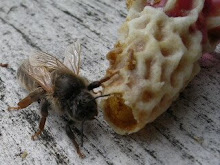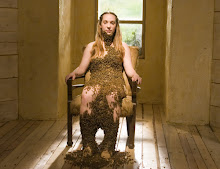I am new to the valley but have been beekeeping enthusiast for about 35 years. My family and I have decided to give the Methow a serious try and my intent is to eventually fulfill a childhood dream making my living as a full time beekeeper.
I have been talking with Dave about my thought of nurturing a strain of bees in the Methow that would ween us off of the need to bring in commercial genetics and all the weaknesses that entails. We have a unique environment here where, if we chose, to we could control diseases and pest of honeybees.
Honeybees do not easily deal with the Alpine conditions that surround the valley, meaning the only ways they can get here is if we bring them in or if they swarm up through the lower reaches of the valley. I have looked at the end of the valley and my conclusion is it is probably so lacking in suitable cavities that very few if any swarms could make it here on their own.
My goal in producing a Methow Bee is that we would be able to fall back to what beekeeping was like 100 years ago. Basic management without chemicals of any kind. I know the survivor genes are already present in the local population of bees. Dave has at least one candidate hive that has survived at least three winters without treatments. While I expect there are very few feral hives in the valley, there are bound to be a few. All we need to do if find them and collect genetic samples to add to our collection.
Anyone else interested in participating? I will be looking for other survivor stock. The criteria is as follows. They need to have survived at least three years without any chemical treatment(hard or soft) of any kind. If they have requeened, it has to have been of their own accord, not because a commercial queen was added during that time period. I would also be most interested those that has minimal feeding done.
Once we start, it will be our job to bring the rest of the beekeepers in the valley along so that we can rid ourselves of unadapted genetics from the outside unless we are expressly and consciously deciding to add to the gene pool from an outside source.
Let me know if you are interested. My email address is
cheers
Hanz Scholz







